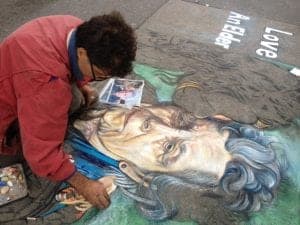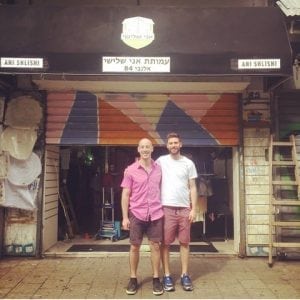Mannequins here and there. Swaths of fabric strewn across drafting tables. Sewing machines and design sketches scattered about. And lots of chatter and dark coffee.
Yotstrot’s studio in Tel Aviv is a hub of creative energy so common in this city. But this one is different. Start talking to the women here, and you will see that besides designing fashion, they are creating new versions of themselves.
“Here, I am learning and understanding that I am a person and not an object, and I can define myself on my own, and not through someone else,” said Lia, a transgender woman in her early 30s who is finding confidence, support and future at Yotsrot as she exits life in the sex trade. “I have choices now.”
Hofchot et Ha’Yotsrot, or Turning the Tables, was founded in 2011 as a force for women’s empowerment, a venue nourishing community and incubating economic security, advancement and transformation for Lia and others climbing out of the vortex of prostitution.
Lilach Tzur Ben Moshe, Yotsrot’s executive director and founder, was a fashion editor at a leading Israeli online news site and used to commute each day past Tel Aviv’s Central Bus Station, where much of the sex trade takes place. She became disturbed and agitated at the exploitation and ugliness of it all to the point of action, using her own background in design to create a way out.
“The greatest motivation for me was seeing in my own eyes, every day, women who are being used, sold, and exploited in prostitution,” she said. “It hit me in in my strongest point of power as a woman and I knew I had to do something to change it.”
Since its establishment, Yotsrot has assisted more than 300 women with vocational training in design, sewing and pattern making in studios in Tel Aviv and Haifa. Ongoing training in digital marketing – a skill necessary for any creative entrepreneur in the 21st century – is also offered with the support of The Good People Fund.
But this is so much more than nuts and bolts training.
In a world in which any sort of trigger can mean a skid toward unintended behaviors, for anyone, Yotsrot is a venue of mutual support and understanding to catalyze self-esteem and fuel dreams. A network of social workers, counselors and others is committed to ensuring that everyone meets their own definition of success and future.
For Lia, who came to Israel from Russia in the early 1990s, that means ultimately using her new confidence to uplift children through performance art. For Or, originally from Ethiopia, it means using some of her newfound creative and technical skills to become a graphic designer.
Yotsrot and everyone involved got a major shot of community validation last year during Tel Aviv’s fashion week, when Yotsrot designs got full runway treatment and exposure, worn by Israeli celebrities, including the wife of the city’s mayor. Another public fashion show will take place in May.
“Knowing every women and every journey she has made, showing on the most lighted stage there is that women in prostitution have so much to offer,” Ben Moshe said, “and seeing and feeling the excitement and the amazing effect on women, this was a moment of pure happiness and pride.”
The organization has had other public moments, actively pushing for anti-prostitution legislation in Israel and being part of a coalition that helped pass a law criminalizing the hiring of prostitutes beginning next year.
“After years of working towards changing public perceptions regarding the damages of prostitution, change has come,” Ben Moshe said.
Back at the Yotsrot studio in Tel Aviv, Lia was fitting a dress she designed for the upcoming fashion show.
“Here, we find out that we can become, and that we can create, and not just break things, including ourselves,” she said. “And that’s everything.”
By H. Glenn Rosenkrantz








